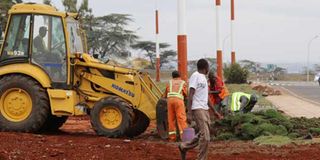Visit highlights leaders’ awareness of city woes

People work on a lawn near the Jomo Kenyatta International Airport in Nairobi on July 24, 2015. The work is part of the Nairobi City County Government’s Sh50 million beautification programme. PHOTO | WILLIAM OERI |
What you need to know:
- Authorities have accepted that US president cannot sit in traffic, drive over a pothole and have his view marred by rubbish or street children.
- The quick-fix attempt at beautification had, according to authorities, already been planned.
US President Barack Obama’s visit to Kenya has attracted unprecedented attention.
Discussion has focused on whether he should be visiting the country at all; what he should (and should not) discuss; the political and economic implications of his trip; and the importance of who he will meet and where he will visit.
Some activists have argued that the US should have distanced itself from the Jubilee administration in protest at rampant corruption, human rights abuses and a narrowing of the political space. In turn, they cast Mr Obama’s visit as a defeat in a much longer war for human rights and good governance.
Other debates have been interwoven with threats. One student leader has suggested that some of his peers will commit suicide if the president fails to visit the University of Nairobi. Other citizens have threatened to hold a naked protest in response to the possibility that Mr Obama might question Kenya’s stance on homosexuality.
In reality, the most important conversations, for example, about what the two governments can do to strengthen Kenya’s counter-terrorism efforts, will likely take place behind closed doors. As a result, the real significance of the trip will long (and perhaps forever) remain obscured.
DISRUPTION
The majority of Kenyans are nevertheless pleased that "Cousin Barry" is visiting. However, for many, excitement is laced with frustration at the disruption to everyday lives that the visit will bring, as roads are closed and residents opt to stay at home or temporarily leave town.
President Obama’s visit has also highlighted the authorities’ awareness of Nairobi’s many problems. The national and county governments have evidently accepted that the president of the United States cannot sit in traffic, drive over a pothole and have his view marred by rubbish or street children.
QUICK FIX
The response: Obamacare. This is a quick-fix attempt to beautify the limited parts of the city the president will pass through, as selected roads are re-tarmacked, rubbish is cleared and lawn is "encouraged" to grow within days.
Wouldn’t it be nice, many lament, if the authorities made such an effort for ordinary tax-paying citizens, rather than for one man who will come and go within days.
Nairobi County’s defence: The beautification drive had already been planned, and Mr Obama’s visit just gave the authorities the “impetus” to start implementation.
More importantly, Mr Obama’s visit has highlighted what a friend recently referred to as the continuation of law as practised, rather than as legislated.
This comment was made in reference to the government’s recent crackdown on illegal alcohol, which followed a declaration by President Uhuru Kenyatta, rather than debates at the county level.
This was despite the fact that, according to the Constitution, “cultural activities, public entertainment and public amenities, including liquor licensing” are a function of county governments.
NOT A CRIME
I was reminded of this discussion last weekend when a friend was arrested on exiting a bar in Westlands last Sunday. The crime: being in a public place without an identity card. Yet, officially, this is not a crime.
There is no law that insists that citizens carry their ID cards at all times. Instead, the arrest followed a security directive to this effect, and an announcement that 15,000 officers were being deployed.
They included personnel from the General Service Unit, the Administration Police, the Kenya Forest Service, the Kenya Wildlife Service and the National Youth Service, and they were to patrol the capital’s streets and estates.
In a similar vein, the legal basis for last weekend’s rounding up of street children, and their subsequent transportation to a "rehabilitation centre", remains unclear.
Such rule by directive is clearly problematic. As with other security operations, it is also undermined by corruption, as officers use it as an opportunity to harass citizens and raise additional income. My friend’s arrest was, thus, short-lived. He opted to pay the officers in question.
In short, preparations for President Obama’s visit have shone a light on various aspects of Kenyan politics. It has highlighted the schism between the government and some civil society organisations; the tendency of protesters to use shock tactics; the state of the country’s capital city and urban planning; the prevalence of rule by directives; and the threat that corruption poses to security efforts. Citizens and analysts will now just have to wait to see what agreements are reached during the actual visit, and with what implications.
Gabrielle Lynch is an associate professor of comparative politics, University of Warwick, UK. ([email protected]; @GabrielleLynch6)





